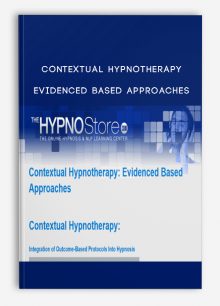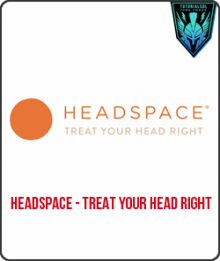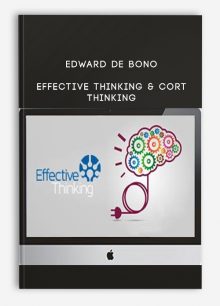Jeff Riggenbach DBT and CBT Related Webinars
$87.00 $59.00

Jeff Riggenbach DBT and CBT Related Webinars
Get Jeff Riggenbach DBT and CBT Related Webinars on Salaedu.com
Description:
[4 MP4] [TEXT]With over 400 clinical outcome trials, Cognitive-Behavior Therapy (CBT) is the most evidence-based psychological treatment approach and is widely considered the best practice for a variety of clinical conditions.
Trained at the Beck institute of Cognitive Therapy, Dr. Jeff Riggenbach has developed expertise in applying cognitive-behavioral therapy to a variety of clinical populations. Join him for this engaging and dynamic seminar as he draws from clinical experience, current literature and outcome findings to give you the skills you need to succeed when applying CBT to any client population. Learn to help clients identify and restructure maladaptive cognitions and beliefs responsible for driving their problematic behavior, as well as helping them develop healthier alternative coping skills. Rapport-building strategies and motivational techniques useful for engaging clients in the treatment process will also be discussed.
Take home 21 CBT-related techniques you can use immediately to improve your practice. Case studies, discussion groups, role plays and video clips will be utilized in this enjoyable seminar that will offer you a chance to learn cutting-edge skills to improve and enhance your understanding of CBT and help your clients live more enjoyable lives.
objectives: Describe the latest empirically supported treatment techniques from CBT, DBT, motivational enhancement therapy and schema-focused therapy and demonstrate how each can be used within the frame of a cohesive treatment model
Utilize MET strategies to successfully enhance motivation in “resistant” clients such as substance abusers, self-mutilators and court mandated clients
Develop a case conceptualization framework that considers how unique life experiences contribute to a person’s individual differences that can impact treatment
Utilize case conceptualization knowledge to formulate a user-friendly diagram for individual treatment planning that can drive successful treatment of any psychiatric condition
Acquire evidence-based CBT skills demonstrated to be helpful in treating
Axis I conditions such as clinical depression, panic disorder, PTSD, Phobia Implement DBT skills such as mindfulness, emotion regulation and distress tolerance skills useful with emotionally dysregulated clients including individuals with BPD, intermittent explosive disorder and other angry/volatile clients
Utilize impulse control strategies demonstrated to be successful in reducing and eliminating self-harming behaviors, binge eating, purging and other impulsive and destructive behaviors
Apply advanced schema modification strategies demonstrated to be helpful treating borderline and narcissistic personality disorders as well as other difficult-to-treat clients that often get “stuck” in the therapeutic process
Gain skills to deal with more complex issues frequently seen but rarely addressed in the clinical setting such as issues of jealousy, “victim-mentality,” somatic complaints and others that often interfere with successful treatment outcomes Jeff Riggenbach – New Trends In CBT, Advanced Techniques For Treating Your 5 Most Difficult Clients (2011)
Description:Evidence-Based Treatments for: Anxiety Personality Disordered Clients Treatment Resistant Depression Suicidal Clients Cognitive-Behavioral Therapy (CBT) is the most researched and empirically supported approach to treating multiple mental health diagnoses, and is widely considered the treatment of choice for a variety of psychiatric conditions. Complete this seminar recording and take home empirically supported treatment techniques for your most difficult and treatment resistant clients: The Chronically Depressed Client The Highly Anxious Client The Personality Disordered Client Angry & Volatile Client This seminar recording will teach you a more comprehensive cognitive approach and provide you with multiple cognitive and behavioral strategies that you can integrate into your practice. Learn in-depth schema focused interventions that are useful for addressing more difficult clinical problems. Incorporate a multi-modal approach that will provide you with specific techniques that can be implemented immediately from the disciplines of CBT, MET and DBT. Dr. Jeff Riggenbach trained with the Beck Institute of Cognitive Therapy and has developed expertise in applying CBT to difficult clients. Through the use of an engaging presentation, handouts, case studies, and video clips, you will develop structured intervention strategies for success with the most difficult to treat clients.
objectives: Acquire knowledge of treatment models for challenging cases. Utilize evidence-based strategies for treating difficult clinical conditions including OCD, treatment resistant depression, personality disorders. Develop competency in treatment techniques from CBT , DBT , metacognitnitive & Motivational Approaches. Demonstrate how case conceptualization drives effective treatment planning & improves outcomes. Utilize effective techniques for cross-cutting symptoms like paranoia, insomnia, & impulsivity. Discuss case studies to increase understanding of multiple symptom sets and disorders. Jeff Riggenbach – Personality Disorders, The Challenges of The Hidden Agenda (2012)The client whose problems meet DSM-IV-TR® and proposed upcoming DSM-5® criteria for personality disorder can be the most difficult client on your caseload to treat. It is no wonder most social service providers and mental health professionals feel helpless in the face of the obstructive power of a personality disorder in a client or client’s family member. In this seminar recording, learn strategies to assess and manage the most treatment resistant conditions. Reduce treatment failures and overcome the biggest obstacles to successful treatment outcomes.
Drawing from the most recent outcome literature, clinical trials, case studies and clinical experience, Dr. Jeff Riggenbach presents an integrated approach for dealing with these difficult clients. End with specific and practical strategies that you can use in your clinical setting immediately.
Learning the proposed DSM-5® Personality Disorder SystemWhat is personality?
Where does it come from?
Genes vs. family?
Methods of personality conceptualizationDisorder vs. traits?
Spectrum vs. categories?
A bump in the road or the end of the line
It’s All About Me! The Challenges of the Hidden Agenda
The core of the personality disorder: the unchanging agenda
Overview of DSM-IV-TR® and proposedDSM-5® Criteria and their agendas
Borderline
Antisocial (and Psychopaths!)
Narcissistic
Histrionic
Avoidant
Dependent
Obsessive-compulsive
Paranoid
Actually, It’s All About You
Transference and countertransference
The thinking of the therapist
The role of clinician’s responses intreatment outcome
Importance of clinician self-careWhat Works and What Doesn’t with Personality Disorders
DBT, CBT and the rest—what works for whom and what does the evidence say?Polypharmacy and the borderline clientGeneric but incredibly useful therapy interventions for each disorder
Nobody Gets Hurt: Violence, Suicide and Manipulation
The frustration of recurrent suicidal behavior
Self-injurious behavior
Suicide risk assessment
Keeping yourself safeList and summarize the essential characteristics of each of the personality disorders in DSM-5®Identify the hidden agendas of each of the personality disorders
Assess the treatability and prognosis of each disorder
Evaluate the efficacy of various treatment methods including CBT and DBT
Describe ways to manage suicidality, violence and self-mutilating behavior so no one gets hurt
Outline case conceptualization skills useful for individualizing treatmentplanning and driving effective treatment
Discover how to actually like your Axis II patients! (or at least develop more frustration tolerance)
Running Time 6 Hours 23 Minutes Jeff Riggenbach – Suicide, Parasuicide And Other Out-of-Control Behaviors (2010)
Description:Suicide and parasuicide are often thought of similarly and even paired clinically in diagnostic criteria; however, effective intervention requires an understanding of the unique function each particular behavior serves. Suicidality in the clinical setting presents dilemmas that often constitute the most challenging situations. Many clients can frustrate you with seemingly endless threats or gestures with suicidal innuendo, cutting, burning, or other self damaging or destructive behaviors. “Do I ignore it?”, “Do I intervene?”, “If so, how?”, “Help!” are common cries of professionals working with populations with such manipulative or impulsive behavior. attend this seminar and learn interventions to help you effectively treat the client who is suicidal, parasuicidal or out-of-control.
In this dynamic seminar recording, Dr. Jeff Riggenbach will demonstrate how to rapidly and sensitively assess suicidality and parasuicidality and present practical strategies for intervening effectively in a variety of clinical settings.
objectives: Acquire 21 skills to promote more effective episode management with volatile clients Describe four specific interventions demonstrated to enhance motivation in court mandated and other unmotivated consumers Develop competency in four Core DBT Skill Sets Summarize the eight motivations for parasuicidal behavior and how to intervene effectively with each Discuss the three most important dimensions of risk assessment and how to document each in a ways that minimizes your liability Discuss behavioral strategies for dealing with manipulators and other “treatment savvy” clients at various levels of care Initiate knowledge and implementation of five advanced techniques demonstrated to promote wellness at a “deeper level”” Demonstrate ability to implement a variety of treatment techniques within a comprehensive treatment framework Discover how to not get your “buttons pushed”!
NLP online course
So what is NLP?
Firstly, NLP stands for Neuro-Linguistic Programming. Secondly neuro refers to your neurology;
Thirdly linguistic refers to language however, programming refers to how that neural language functions.
As a result,In other words, learning NLP is like learning the language of your own mind!
Moreover, NLP is the study of excellent communication–both with yourself, and with others.
It was developed by modeling excellent communicators and therapists who got results with their clients.
NLP is a set of tools and techniques, but it is so much more than that.
In conclusion, It is an attitude and a methodology of knowing how to achieve your goals and get results.
1 review for Jeff Riggenbach DBT and CBT Related Webinars
Add a review Cancel reply
Related products
HYPNOSIS - NLP Courses
HYPNOSIS - NLP Courses
HYPNOSIS - NLP Courses
HYPNOSIS - NLP Courses
HYPNOSIS - NLP Courses










king –
“We encourage customers to contact Customer Service and think twice before making payment. All course contents will be similar to what is from the author.”
Thank you!